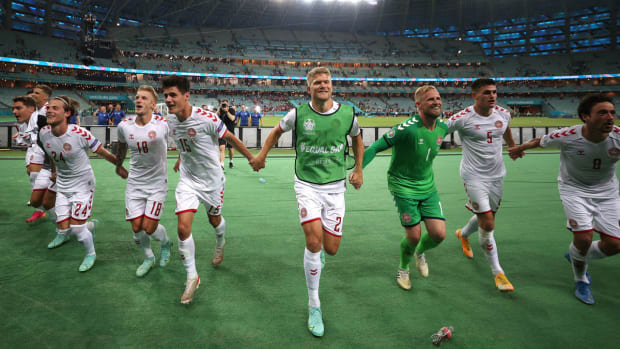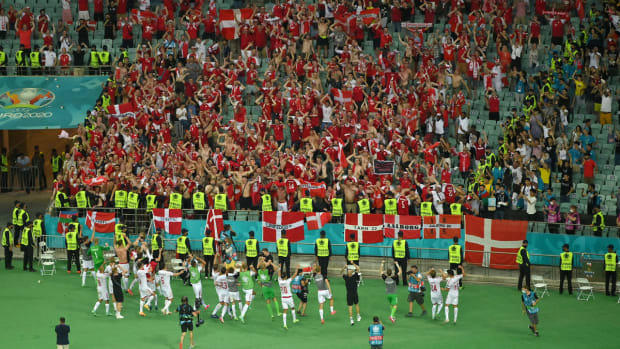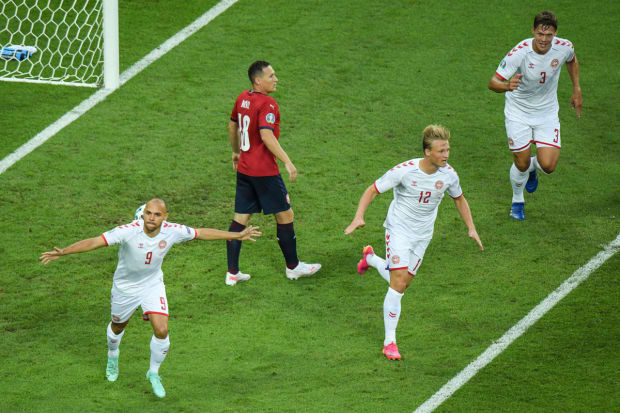There's a big element of destiny to Denmark's run at the Euros, but don't discount the quality of the play and the shared solidity across the squad.
Football, increasingly, is a game of stats and details, of numbers and analysis, heat maps and algorithms. But it is also about emotion, and Denmark continues to ride the wave unleashed three weeks ago when Christian Eriksen suffered a cardiac arrest in the first half of its opening group game against Finland. A 2–1 victory over the Czech Republic on Saturday took Denmark to its first semifinal at a major tournament since winning it all at Euro 92, and it will face England or Ukraine with the chance to return to the final.
Perhaps to focus on the emotional aspect is unfair. Denmark is a very well-drilled side, far more than the sum of its parts. It has clearly benefited from the management of Kasper Hjulmand, who replaced Åge Hareide last year. It’s a recurring pattern in sport that a team blossoms under a charismatic man-manager when he replaces a hard taskmaster who has instilled the necessary structure but perhaps lacked the ability to inspire the self-belief necessary for players fully to express themselves (it happened, for instance, at Leicester, when Claudio Ranieri succeeded Nigel Pearson).

And yet the emotion is a major part of it. Denmark, it should not be forgotten, lost its first two group games, yet the forces unleashed before that second game, against Belgium, even if the game was lost, continue to reverberate. Eriksen’s absence forced a change of shape that has clearly been beneficial, but it is more than that. Hjulmand spoke after Eriksen’s collapse of how the players, brought face-to-face with mortality, had contacted family and friends while waiting for the game to restart, minds cleared, petty concerns dispelled. In the camp, a place is still set at dinner for Eriksen; the memory of his scare has been embraced and will not be forgotten.
A useful side-effect is to put football into perspective, simultaneously to ease the pressure on players and to foster a togetherness, with shared trauma generating the sense of a quest. That Denmark is the only side ever to qualify for the knockouts having lost its first two games only adds to the feeling that this is a fairytale, that destiny is behind this.
The shame was so few were there to see its latest triumph. The Baku Stadium in Azerbaijan was cleared to be half full, but only around a third of that turned up, around 10,000 total that included 1,500 Danes and 300 Czechs. That raises once again the question of why UEFA is prepared to host games whose main purpose is to bolster the image of an autocratic regime. There was a report of local security confiscating a rainbow flag from Danish fans.

As for the match itself, Denmark, playing with great self-belief, was ahead after just five minutes. The Czechs’ height and set-piece prowess were supposed to be among their major threats, but it was from a Danish corner—one controversially given—that the opener came. Simon Kjaer made a clever blocking run as Jens Stryger Larsen arced the ball in from the right but, still, Thomas Delaney was left bafflingly unmarked to head in without even having to leave the ground.
Stryger Larsen, the Danish right wingback, was a persistent threat, as was Joakim Maehle on the left. In a first half in which two sides playing matching shapes largely canceled each other out, it was the forward thrusts from wingback that gave Denmark an edge. That advantage brought a second goal three minutes before halftime, with Maehle, a right-footer playing on the left, crossing with the outside of his right foot for Kasper Dolberg to slam in his third of the tournament.

This has been a difficult year for Dolberg. He is only 23 but already has a career’s-worth of difficulty behind him. Great things were predicted for him when he was at Ajax, but he had begun to stagnate when he was offloaded to Nice in 2019. In this past season he has missed time due to COVID-19 and injury and had his car and watch stolen—the latter at the hand of a teammate. He only started because of the injury to Yussuf Poulsen, but he scored twice against Wales and added his 10th international goal here. But any thought the game was done rapidly vanished after the break.
Czech Republic manager Jaroslav Šilhavý made two substitutions at halftime, changed the shape to 4-4-2 and was rewarded within four minutes as Patrik Schick pulled one back with a controlled volley from a Vladimír Coufal cross, matching Cristiano Ronaldo atop the golden boot standings. For a while, Denmark wobbled, but Hjulmand’s changes, particularly the introduction of Poulsen for Dolberg, brought an element of control. By the end, the Czechs were reduced to lofting balls hopefully into the box, but the Danish back three were comfortable enough with that.
And so the great narrative goes on. Reaching the last eight probably represented a realistic target for Denmark at the start of the competition. It has gone beyond that now—and could go all the way.
More Euro 2020 Coverage:
- Wilson: Spain, Switzerland and Penalty Kick Role Reversal
- Wilson: In Ending Belgium's Title Dream, Italy Gives Rise to Its Own
- Wilson: Where it Went All Wrong for France
- Wilson: England's Approach vs. Germany Winds Up Being Perfect
There's a big element of destiny to Denmark's run at the Euros, but don't discount the quality of the play and the shared solidity across the squad.
Football, increasingly, is a game of stats and details, of numbers and analysis, heat maps and algorithms. But it is also about emotion, and Denmark continues to ride the wave unleashed three weeks ago when Christian Eriksen suffered a cardiac arrest in the first half of its opening group game against Finland. A 2–1 victory over the Czech Republic on Saturday took Denmark to its first semifinal at a major tournament since winning it all at Euro 92, and it will face England or Ukraine with the chance to return to the final.
Perhaps to focus on the emotional aspect is unfair. Denmark is a very well-drilled side, far more than the sum of its parts. It has clearly benefited from the management of Kasper Hjulmand, who replaced Åge Hareide last year. It’s a recurring pattern in sport that a team blossoms under a charismatic man-manager when he replaces a hard taskmaster who has instilled the necessary structure but perhaps lacked the ability to inspire the self-belief necessary for players fully to express themselves (it happened, for instance, at Leicester, when Claudio Ranieri succeeded Nigel Pearson).

And yet the emotion is a major part of it. Denmark, it should not be forgotten, lost its first two group games, yet the forces unleashed before that second game, against Belgium, even if the game was lost, continue to reverberate. Eriksen’s absence forced a change of shape that has clearly been beneficial, but it is more than that. Hjulmand spoke after Eriksen’s collapse of how the players, brought face-to-face with mortality, had contacted family and friends while waiting for the game to restart, minds cleared, petty concerns dispelled. In the camp, a place is still set at dinner for Eriksen; the memory of his scare has been embraced and will not be forgotten.
A useful side-effect is to put football into perspective, simultaneously to ease the pressure on players and to foster a togetherness, with shared trauma generating the sense of a quest. That Denmark is the only side ever to qualify for the knockouts having lost its first two games only adds to the feeling that this is a fairytale, that destiny is behind this.
The shame was so few were there to see its latest triumph. The Baku Stadium in Azerbaijan was cleared to be half full, but only around a third of that turned up, around 10,000 total that included 1,500 Danes and 300 Czechs. That raises once again the question of why UEFA is prepared to host games whose main purpose is to bolster the image of an autocratic regime. There was a report of local security confiscating a rainbow flag from Danish fans.

As for the match itself, Denmark, playing with great self-belief, was ahead after just five minutes. The Czechs’ height and set-piece prowess were supposed to be among their major threats, but it was from a Danish corner—one controversially given—that the opener came. Simon Kjaer made a clever blocking run as Jens Stryger Larsen arced the ball in from the right but, still, Thomas Delaney was left bafflingly unmarked to head in without even having to leave the ground.
Stryger Larsen, the Danish right wingback, was a persistent threat, as was Joakim Maehle on the left. In a first half in which two sides playing matching shapes largely canceled each other out, it was the forward thrusts from wingback that gave Denmark an edge. That advantage brought a second goal three minutes before halftime, with Maehle, a right-footer playing on the left, crossing with the outside of his right foot for Kasper Dolberg to slam in his third of the tournament.

This has been a difficult year for Dolberg. He is only 23 but already has a career’s-worth of difficulty behind him. Great things were predicted for him when he was at Ajax, but he had begun to stagnate when he was offloaded to Nice in 2019. In this past season he has missed time due to COVID-19 and injury and had his car and watch stolen—the latter at the hand of a teammate. He only started because of the injury to Yussuf Poulsen, but he scored twice against Wales and added his 10th international goal here. But any thought the game was done rapidly vanished after the break.
Czech Republic manager Jaroslav Šilhavý made two substitutions at halftime, changed the shape to 4-4-2 and was rewarded within four minutes as Patrik Schick pulled one back with a controlled volley from a Vladimír Coufal cross, matching Cristiano Ronaldo atop the golden boot standings. For a while, Denmark wobbled, but Hjulmand’s changes, particularly the introduction of Poulsen for Dolberg, brought an element of control. By the end, the Czechs were reduced to lofting balls hopefully into the box, but the Danish back three were comfortable enough with that.
And so the great narrative goes on. Reaching the last eight probably represented a realistic target for Denmark at the start of the competition. It has gone beyond that now—and could go all the way.
More Euro 2020 Coverage:


0 Comments